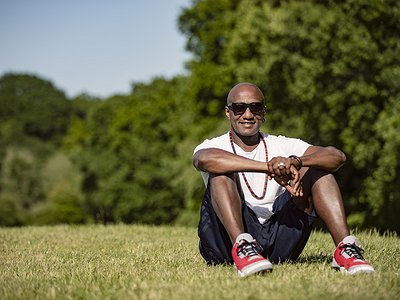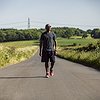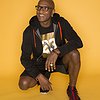Part 2
What were some of the main challenges and goals when starting out as a DJ and how have they changed over time? What is it about DJing, compared to, say, producing your own music, that makes it interesting for you?
Well the biggest challenge for me when I started DJing in the 80s was that you had to speak in the microphone a bit like an MC, I hated that and I was so bad at it! I’m glad that did not last. Of course there was always the challenge of finding jobs and impressing the club owners. I often had to work in clubs where I had to play so many different kinds of music, and that was also a challenge depending on your own taste. Honestly I didn’t have any career ambitions when I started, I just wanted to play music for people and make them dance, I didn’t even think about how much I was being paid.
With time, DJing became more professional and I started to evolve in my musical taste. I started playing more and more house. The world of music was changing too, with the explosion of rave parties and all that, we all thought there was something new going on. I worked for six years in Switzerland and then in 1993 I moved to London. And that completely changed my career, because the UK has a huge scene and the music culture is so strong here. I met incredible people in the scene, in clubbing. I became a lot more professional, but also there was a lot of competition and there were so many challenges, I didn’t know many people at first and I hardly spoke any English.
For me, the salvation were record shops. That’s where I met so many friends and future collaborators. It was also a great way to be connected to the scene, to be involved in what was going on in music, I’m very nostalgic about that time when there were so many important record shops in London. You could have direct contact with DJs and give them your records.
I realised I had to get into producing my own music. Thankfully I met a very talented musician from Portugal in a studio in Brixton, Paulo Nascimento. We became friends and together we started Access 58. First it was us two making music and then we started our own label. We played at gigs, together live, and I was DJing. That’s how we got into the London scene, meeting people who were influential and interesting and in some cases very helpful, like my mate Colin Dale. I followed his show on KissFM and sometimes he would invite us to play, and we would meet so many interesting people in that studio at the radio station, and in clubs. People like Colin Faver, a great expert in music, a pioneer, and such a gentle and humble soul, who sadly left this world. It’s that kind of personality I miss today.
What makes DJing the most interesting thing for me is how it enables me to listen to music, so much music, and discover magical sounds and share them with people. Automatically, I find music that moves me and inspires me in turn with my own production. The more you play, the more you listen to music, all kinds of music, the more you open your mind. Not only electronic music, but you get more curious and you seek out all kinds of stuff: jazz concerts, folk singers, everything and all kinds of art even.
How would you define the job and describe the influence of the DJ? How are the experience and the music transformed through your work?
Well I’m quite classic or old school about the work of a DJ, I think it’s about doing an enormous amount of research and exploration, listening to tons of music and curating a special selection to share with the public. That’s what is amazing about this work, to share your passion.
In the old days you had to fight to find records, maybe sometimes there were only 100 copies and you had to fight for it. Every time I went to see DJs play, and listen to their research and selection, and experience how they would share this, I always had these incredible surprises. There was authenticity in how each DJ expressed himself or herself, each one had his/her own personality and maybe that is something lost today, with global marketing and how so many people sound the same. I find now it’s too safe, people are afraid it’s not going to work out, and the crowd is not going to like it. So they don’t take chances. For some promoters, if you don’t play the sound of the moment they don’t want you. DJs take less and less risks.
It's a bit like a guy who buys art. He’s going to select according to his taste and then he’s going to show this choice to people. What’s beautiful is to share with others your discoveries and your personal vision.
What was your first set-up as DJ like? How and for what reasons has your set-up evolved over the years and what are currently some of the most important pieces of gear for you?
At the start of my career, in a club, I was using two turntables Technics MK2 with a Rodec mixing table. Actually it was the 1800 model of MK2s, so the pitch control was like a roller, which means it was a lot more difficult to be precise and consistent with adjusting speed, it was hard work on your fingers and you really had to really focus to get it right. At home or in my own studio I’ve always had MK2 turntables with a small mixing table and speakers. Classic. I’ve never changed that set-up, just evolved with the different models over the years. I’ve never had the Pioneer CDJ equipment at home, but in clubs I use that, mostly with flash drives not CDs. When I play I always ask for 2 turntables and 3 Pioneer CDJs. For a few years I played with CDs but not anymore, now I use vinyl and flash drives. The USB sticks are so convenient for travelling.
I think that’s the most important gear for a DJ: two turntables, a mixer and speakers. I don’t use effects.
How do you make use of technology? In terms of the feedback mechanism between technology and creativity, what do humans excel at, what do machines excel at?
When Paulo and I started with Access 58 we had a big studio in Bethnal Green, in East London. We went a bit mad with gear, you know it was my first studio ever. But to be honest with you, now with all the plug-ins and other software you don’t need that much equipment in a studio. I went from maximal to minimal!
I realise now that I use very little stuff. I have my studio in Geneva. But during lockdown I was with my family in London and I only had with me my computer and a controller, with a pair of small speakers. That’s what I’m using to work on my upcoming album. With the software I have and all the plug-ins I can do my work with very little - although of course I love using all the wonderful analogue equipment, but I can do without it.
I’ve also realised that the less equipment I have, the more I have to focus on the ideas, I get better ideas. Humans are good for that, ideas, feelings, inspiration. Machines help you and make your task a lot easier. Some things you can’t do without machines, it makes your work more efficient and so much faster. Technical equipment also evolves very quickly, and gets more and more efficient and helpful. But you know, there’s no need to have a huge studio all kitted out if you only use five percent of the stuff on any given day.
I’m in that group of producers who try to use the little equipment they have to the max, and I only get gear if I’m feeling limited with what I have. It’s much better for my finances too! In any case, I get no complaints about my production.








